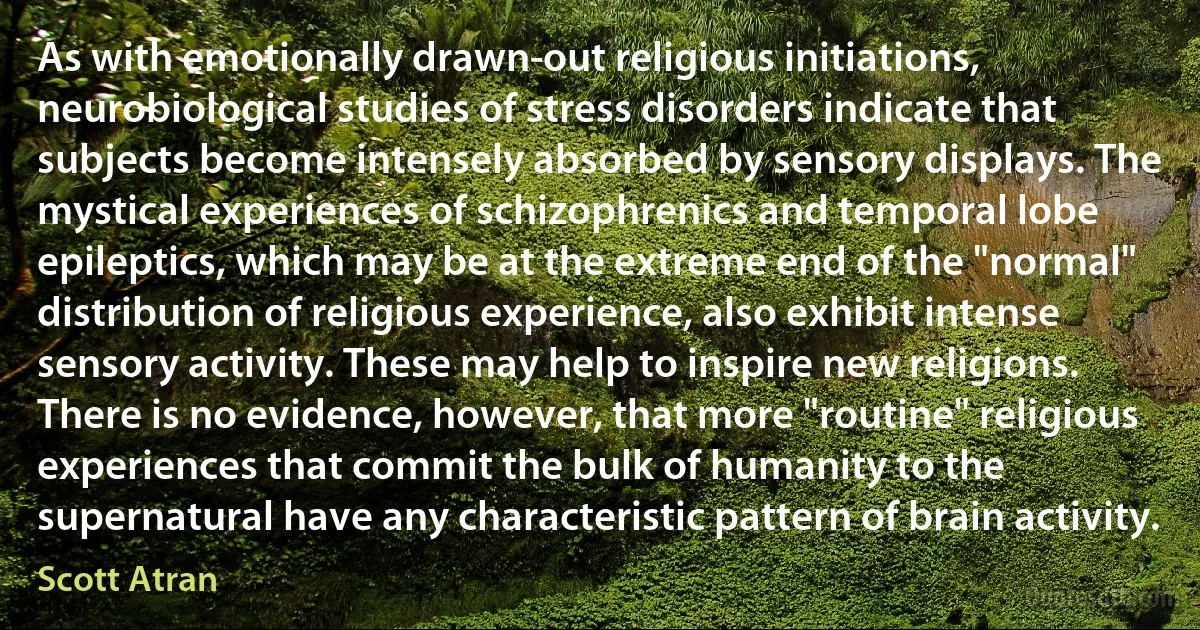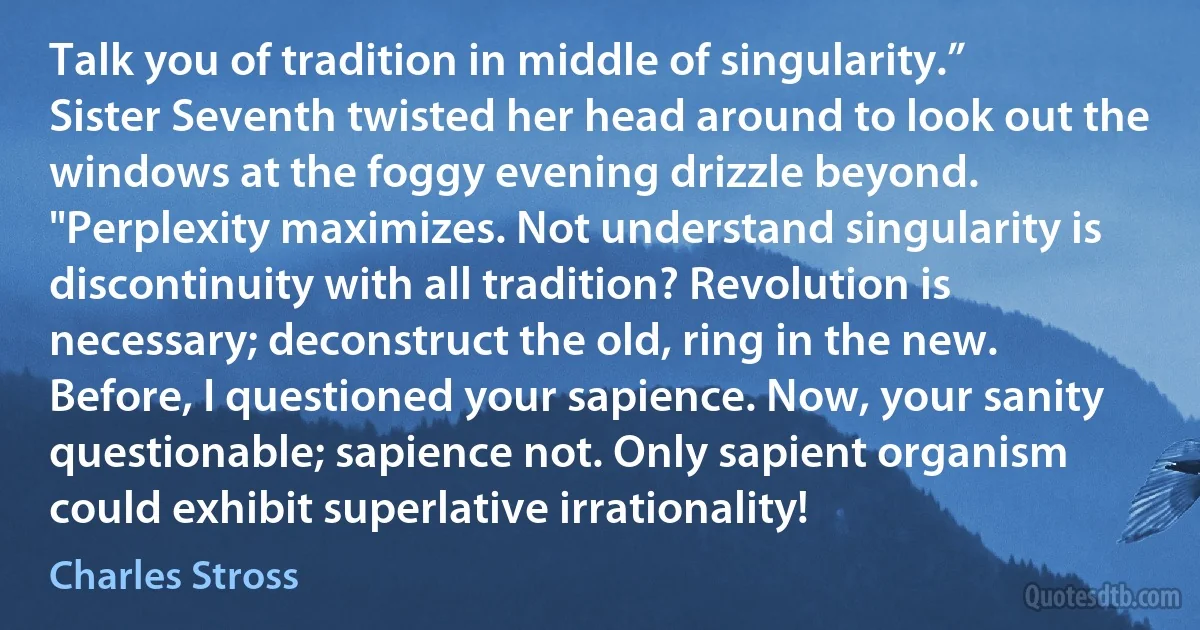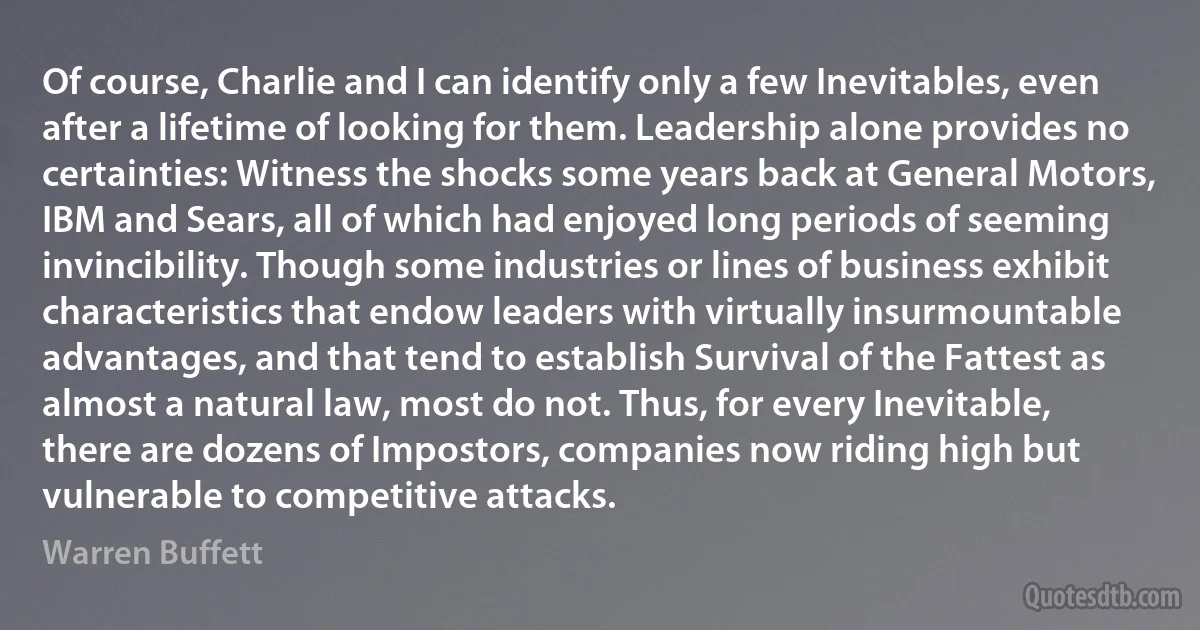Exhibit Quotes - page 3
I thank you most sincerely for your polite notice of me, in the elegant Lines you enclosed; and however undeserving I may be of such encomium and panegyrick, the style and manner exhibit a striking proof of your great poetical Talents. In honour of which, and as a tribute justly due to you, I would have published the Poem, had I not been apprehensive, that, while I only meant to give the World this new instance of your genius, I might have incurred the imputation of Vanity. This and nothing else, determined me not to give it place in the public Prints.

George Washington
It didn't pay very much, but it enabled me to get other jobs doing art criticism, which I didn't want to do very much, but as so often when you exhibit reluctance to do something, people think you must be very good at it. If I had set out to be an art critic, I might never have succeeded.

John Ashbery
Cellular automata are discrete dynamical systems with simple construction but complex self-organizing behaviour. Evidence is presented that all one-dimensional cellular automata fall into four distinct universality classes. Characterizations of the structures generated in these classes are discussed. Three classes exhibit behaviour analogous to limit points, limit cycles and chaotic attractors. The fourth class is probably capable of universal computation, so that properties of its infinite time behaviour are undecidable.

Stephen Wolfram
I fly to Luxembourg on Berlusconi's usual twin engine, who accompanies us, glad to exhibit himself and exhibit his status in an international ceremony. The gold medal (but is it really gold?) is given to me by Gaston Thorn, head of the Luxembourg government. Berlusconi fills his notebook with addresses: of all the V.I.P.'s that he has met. He's a true climber that takes advantage of everything and throws nothing away.

Indro Montanelli
An engineering science aims to organize the design principles used in engineering practice into a discipline and thus to exhibit the similarities between different areas of engineering practice and to emphasize the power of fundamental concepts. In short, an engineering science is predominated by theoretical analysis and very often uses the tool of advanced mathematics.

Qian Xuesen
Gandhi had been right. There was only one way to behave, even if it seemed, in the short term, against one's self-interest. Surely it was in one's self-interest in the long term to exhibit generosity, humanity, kindness and a sense of justice to one's fellow men. It was cynicism of Beesley's kind which had, after all, led to the threatened extinction of the whole human race. There could be no such thing s a "righteous” war, for war was by its very nature an act of injustice against the individual, but there could be such a thing as an "unrighteous” war-an evil war, a war begun by men who were utterly corrupt, both morally and intellectually. I had begun to think that it was a definition of those who would make war-that whatever motives they claimed, whatever ideals they promoted, whatever "threat” they referred to, they could not be excused-because of their actions they could only be of a degenerate and immoral character.

Michael Moorcock
When taken as a way of modeling cognitive architecture, connectionism really does represent an approach that is quite different from that of the classical cognitive science that it seeks to replace. Classical models of the mind were derived from the structure of Turing and Von Neumann machines. They are not, of course, committed to the details of these machines as exemplified in Turing's original formulation or in typical commercial computers-only to the basic idea that the kind of computing that is relevant to understanding cognition involves operations on symbols.. In contrast, connectionists propose to design systems that can exhibit intelligent behavior without storing, retrieving, or otherwise operating on structured symbolic expressions. The style of processing carried out in such models is thus strikingly unlike what goes on when conventional machines are computing some function.

Jerry Fodor
Time is a corrosive fluid, dissolving motivation, destroying novelty, and leaching the joy from life. But forgetting is a fraught process, one that is prone to transcription errors and personality flaws. Delete the wrong pattern, and you can end up becoming someone else. Memories exhibit dependencies, and their management is one of the highest medical art forms.

Charles Stross
My dear Zola, - I am making up my mind to hold a private show. I have at least two score pictures to exhibit. I've already already been offered a site in a very good location near the Champ de Mars. I am going to stake the lot and seconded by men like yourself, am hopeful of success. See you soon. Cordially, yours ever, All of us here are delighted with your article, and I am instructed to send you thanks.

Édouard Manet
But our openness to the dazzling possibilities presented by modern science must be tempered by some hard-nosed skepticism. Many interesting possibilities simply turn out to be wrong. An openness to new possibilities and a willingness to ask hard questions are both required to advance our knowledge. And the asking of tough questions has an ancillary benefit: political and religious life in America, especially in the last decade and a half, has been marked by an excessive public credulity, an unwillingness to ask difficult questions, which has produced a demonstrable impairment in our national health. Consumer skepticism makes quality products. This may be why governments and churches and school systems do not exhibit unseemly zeal in encouraging critical thought. They know they themselves are vulnerable.

Carl Sagan
One hypothesis about the delay for the award is that the prize committee realizes that recipients tend to shirk once they get the prize. This consideration was particularly important in Gary's case because he had continued to exhibit high productivity. Thus, the drop in output caused by an early prize for Gary might have had severe adverse consequences for economic research.

Robert Barro
Physically, we transmit signals or signs -- audible, visual, tactual. But the mere transmission and reception of a physical signal does not constitute communication. A sign, if it is perceived by the recipient, has the potential for selecting responses in him. Physically, when we communicate, we make noises with our mouths, or gesticulate, or exhibit some token or icon, and these physical signals set up a response behavior.

Colin Cherry
Ki tests are not founded on the idea of testing for strength or weakness. The most important factor in ki testing is to accurately inform the person of the state of his or her mind. Thus, the person performing ki tests must truly understand and exhibit oneness of mind and body from the outset and then perform the tests correctly.

Koichi Tohei
It seems reasonable to suppose that conflict does exhibit many general patterns, that the patterns of conflict in industrial relations, international relations, interpersonal relations, and even animal life are not wholly different from one another, and that it is, therefore, worth looking for the common element. On the other hand, we should be surprised if there were no differences; the pattern of conflict in international relations, for instance, is not the same as in industrial or interpersonal relations. Just as it is important to perceive the similarities in different situations, so it is important to perceive the differences. These differences cannot be perceived, however, without a general theory to serve as a standard of comparison.

Kenneth Boulding



